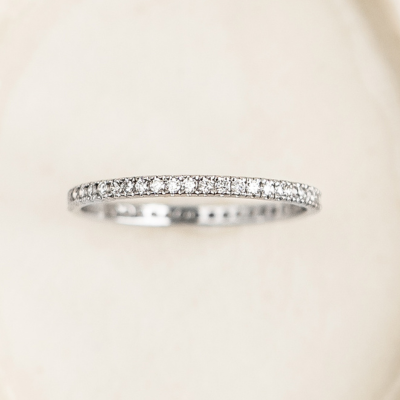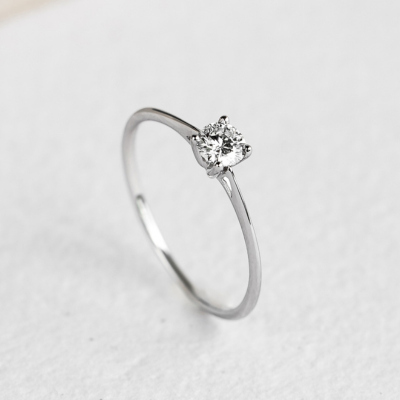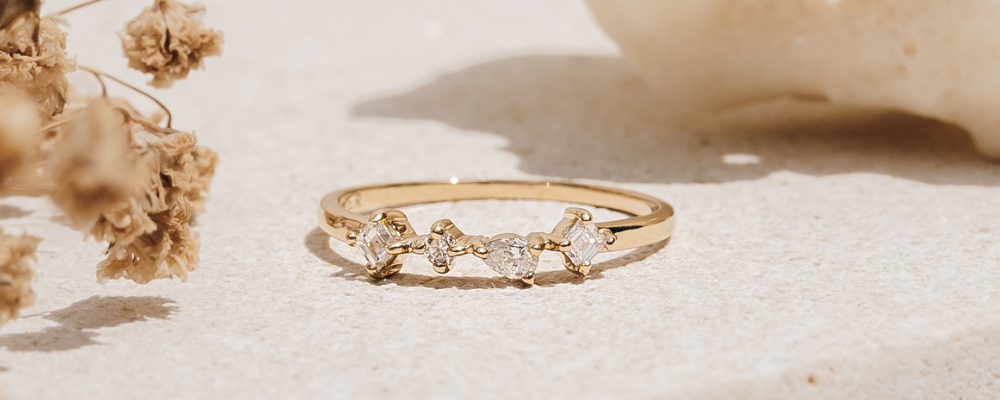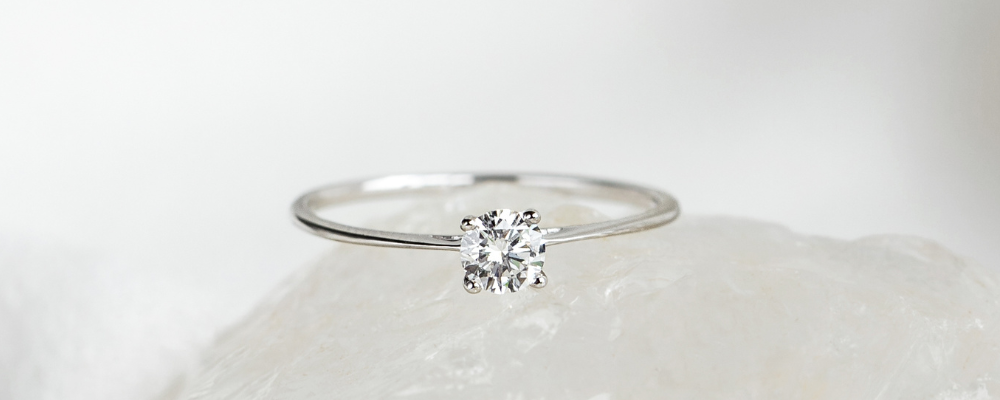White Gold vs Yellow Gold: All You Need to Know | Linjer Jewelry
White Gold vs. Yellow Gold: Composition
White gold and yellow gold have different compositions that give them their distinct colors. Both yellow and white gold are alloys as gold in its purest form—24k gold—is too soft and malleable for use. Yellow gold has a classic soft yellow color and is usually mixed with metals like silver and copper, while white gold gets its silvery-white color from metals such as palladium, silver and platinum.
Both yellow and white gold can come in different karatages, which refer to the percentage of pure gold in the alloy. For example, 14k yellow gold contains 58.3% pure gold, while 14k white gold typically contains around 58% pure gold. However, 18k yellow and white gold both contain approximately 75% pure gold.
The combination of metals in both yellow and white gold also provides them with additional durability and resistance to scratches. Whether you prefer the classic warmth of yellow gold or the modern elegance of white gold, understanding their compositions can help you make an informed decision when purchasing fine jewelry!
Shop Our 14k Gold Jewelry
Diamond Solitaire Ring |
Diamond Ring - Ilse Luxe |

See Product |
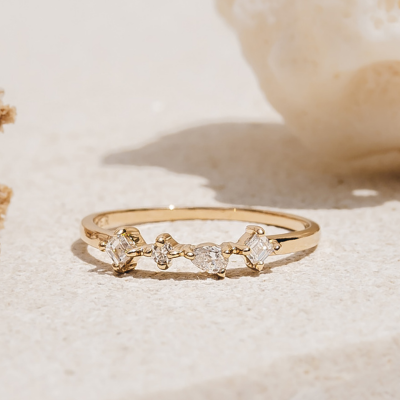
See Product |
14k Gold London Blue Topaz Ring - Ilse Luxe |
Diamond Eternity Ring |
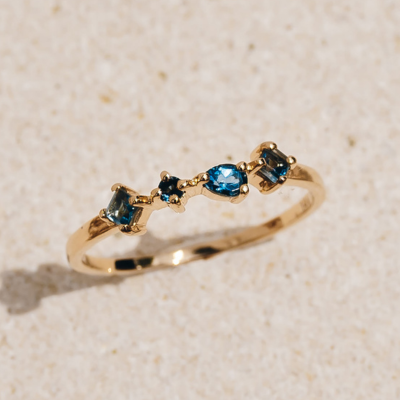
See Product |

See Product |
White Gold vs Yellow Gold: Price
Both white and yellow gold can vary in price depending on their purity, the amount of other metals used in the alloy, and the current market value of gold. Gold’s purity is measured in karats, with 24k gold being the purest form (and most expensive). Pure gold is often mixed with other metals to enhance its durability because pure gold is soft and malleable.
In theory, the higher the karat of the gold, the more expensive it will be since it contains a higher percentage of pure gold. However, other factors such as the complexity and quality of the design, level of craftsmanship involved, use of gemstones, the reputation of the brand, and the production costs can also impact the price of gold jewelry.
Rhodium plating enhances the whiteness and durability of white gold, affecting its price. The amount of rhodium applied can determine the cost of the jewelry piece. The price of white gold is also impacted by types of other metals in the alloy. The more expensive metals used, the higher the price of the white gold.
If you're looking for a cost-effective option without sacrificing quality, independent jewelry brands may be worth considering. Luxury brands often mark up their jewelry by at least 10 times, independent brands (such as Linjer!) can offer the same high-quality pieces at more reasonable prices.
Shop Our 14k White Gold Jewelry
White Gold vs Yellow Gold: Uses
When it comes to choosing the right type of gold for your jewelry, white and yellow gold are both popular options. They can be used for a variety of jewelry pieces, such as rings, necklaces, and bracelets. However, there are some differences in how they are commonly used.
White gold is often preferred for modern and contemporary jewelry designs, as its silver-like appearance complements the sleek and minimalist aesthetic of these styles. On the other hand, yellow gold is more commonly used for traditional and classic designs, as its warm, rich color evokes a sense of timeless elegance.
Ultimately, the choice between white gold and yellow gold completely comes down to personal preference and style. Whether you prefer the modern appeal of white gold or the classic charm of yellow gold, both types of gold can make stunning and elegant pieces of jewelry.
Is White Gold Stronger Than Yellow Gold?
While both white and yellow gold are alloys of gold and other metals, white gold is actually considered to be the stronger option as it is typically alloyed with palladium, or silver, which improves its durability and resistance to damage. It's also often plated with an extra layer of rhodium, which not only makes it look more lustrous but also provides extra protection against scratches and damage.
Yellow gold, on the other hand, is alloyed with copper and silver which makes it softer and more prone to scratches and damage. So, if you're looking for a jewelry piece that can withstand the test of time, white gold might be the way to go. But, as always, the choice ultimately depends on your personal preference!
Is White Gold as Valuable as Yellow Gold
When it comes to the value of white vs yellow gold, both are considered precious metals and can hold significant value. However, the value of both metals can vary depending on factors such as the purity and the current market value of gold.
Both white and yellow gold are alloyed with other metals, which can affect their overall value. It's important to note that in some cases, white gold may be more expensive than yellow gold due to the additional step of rhodium plating to add extra protection and shine to the metal. Ultimately, the value of white vs yellow gold will depend on a variety of factors and should be evaluated on a case-by-case basis.
Does Yellow Gold Look More Expensive Than White Gold?
Yellow gold has traditionally been associated with luxury and wealth, while white gold has been associated with modernity and sophistication. However, the color of the gold is not necessarily an indicator of its actual value or cost. At the end of the day, the perceived value of jewelry depends on your personal preference, cultural influences, and any memories or special meanings associated with your piece!
Is White Gold or Yellow Gold More Popular Right Now?
The popularity of white versus yellow gold can vary based on different factors, such as fashion trends and personal preferences. While white gold has gained popularity in recent years due to its modern and contemporary aesthetic, yellow gold has remained a classic and timeless choice for fine jewelry.
Which Should I Buy - White Gold or Yellow Gold?
The decision to buy white or yellow gold ultimately comes down to personal preference, style, and skin tone. Yellow gold flatters warm or olive skin tones with its golden hue. In contrast, white gold can be a better choice for those with cooler or fairer skin tones!
In terms of style, white gold is often chosen for its modern, sleek appearance, while yellow gold has a classic and timeless appeal with a rich color that pairs well with diamonds and other precious gemstones. It is also more hypoallergenic than white gold, as it is typically alloyed with metals that are less likely to cause skin irritation.
When making your decision, it's important to consider factors such as price, durability, maintenance requirements, as well as your individual taste. Both white and yellow gold are beautiful and valuable choices for fine jewelry. At Linjer, we’re committed to offering timeless, luxury-quality jewelry at accessible prices. Take a peek at our stunning solid gold collection for more options!



